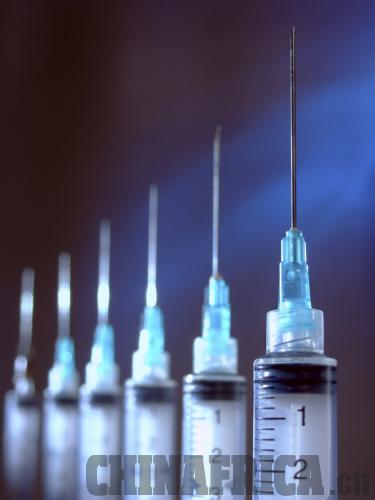| 
It's always nice when expectations are exceeded by half a billion dollars. This was the case for the Global Alliance for Vaccines and Immunization (GAVI) at its fundraising conference in June. A public-private initiative, GAVI, which works to ensure children in developing countries receive crucial vaccinations, had gone into the meeting hoping to net $3.7 billion. They came away with $4.3 billion, "despite the fact that donors everywhere are coping with budget crises," as Bill Gates pointed out in a post on his personal blog. He then pledged an additional $1 billion in support.
These billions, which will be spent over the next four years, are a huge feat for GAVI but not necessarily for Africa. Though many African countries do benefit from GAVI's immunization campaigns, the vaccines they receive are produced outside the continent. Organizations like the Council on Health Research for Development (COHRED) based in Switzerland argue that this oversight hampers efforts to build up vaccine research and development in the African scientific community. Currently, African developers have managed to simplify manufacturing to produce cheaper vaccines.
GAVI works in tandem with the World Health Organization (WHO), whose list of "prequalified" suppliers is full of major Western drug companies. There is only one approved African pharmaceutical producer indexed: Senegal's Institute Pasteur Dakar. (There are no Chinese companies on the list.) Although there are producers in several countries, they are working (so far) without the WHO's stamp, and GAVI dollars may not reach them.
One of these is The Biovac Institute (TBI) in South Africa. TBI's focus is on developing what it calls "locally relevant" vaccines. The company is currently working on tetanus, diphtheria, hepatitis B and other combination vaccines tailored for the African market. According to the public-private initiative, 80 million rand (around $11.6 million) has been invested in its infrastructure and R&D. The eight-year-old company is hoping to qualify for WHO status in the next two years.
In Tunisia, the Institute Pasteur of Tunis has been around since 1893. Its R&D focus ranges from vaccine development for rabies to leishmaniasis, the brutal parasitic killer second only to malaria in its lethality. The institute is also invested in producing biosimilars, which unlike generics are patent law friendly; they are produced after drug companies' patents expire.
Uganda's vaccine production hopes lie with the Uganda Virus Research Institute (UVRI), which has operated under various names from 1936. It receives support from the Bill and Melinda Gates Foundation in its AIDS vaccine research efforts. So far, two vaccine trials have been, first in 2003 with 51 volunteers, and the second in 2006 with 120 volunteers. The institute is also highly involved in community outreach. It's worth mentioning that Kenya has a similar vaccine program underway.
Regardless, getting GAVI behind Africa-based vaccine production is problematic without prequalification. The WHO's regulatory approval procedure is complex, and companies in developing regions often do not have the resource power needed to make a full application. It will be a credit to the international community if GAVI begins promoting local African vaccine manufacturing. It could even put Bill Gates' extra donation toward the cause.
Tech Bytes
➲ In July, the Kenya Open Data Initiative (KODI) was launched. The first platform of its kind in Africa, it allows online users to access data set at national, county and constituency levels that can be formatted as visualizations analyzing trends in spending, energy, health and other areas of interest. KODI can be accessed at http://opendata.go.ke and bymobile phone SMS. The initiative was spearheaded by Kenya's technology community, with both government and World Bank support.
➲ Battery packs are what make electric cars run, and also what make them expensive. But a Beijing-based startup, Wuhe, has found a solution that may lower the cost. The company uses nanostructure materials to produce electrodes and batteries, which are much easier to work with and more powerful. Using iron-phosphate nanoparticles, Wuhe has doubled the storage capacity of the current, typical electric car battery. The company is anticipated to profit from mass-marketing the technology. |